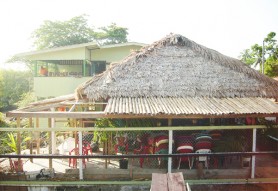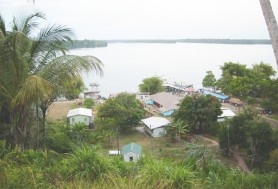-residents nervous
Talks of turning the Amerindian reservation of Orealla into Guyana’s next hottest tourist attraction dominated the village’s heritage celebrations but many residents questioned the advantages of such a move.

Orealla is located about 50 miles up the Corentyne River from Crabwood Creek, Corentyne, Berbice. It is home to about 1,000 people and was recently pushed into the tourism spotlight with the launching of a guest house during its heritage celebrations on September 11.
Corentyne Tours (Cortours), a tourist group which claims to be an ecotourism provider, formally opened the activities of its new guest house in Orealla. The Amerindian reservation will be one of the stops on a tour that ends several miles up river at Wanatobo Falls.
But as Minister of Tourism Manniram Prashad commissioned the fifteen room structure, during Orealla’s heritage celebrations, some villagers voiced concerns about what was going to happen to their home. Some amount of xenophobia was present in the words of several villagers.
For many, Orealla is their place of birth and the only home they have known in their lives. It is where they have raised their children, provided for their family and battled against the foreign cultures which are slowly killing their own. Fear and “a little resentment” of the strangers who will bring a variety of new cultures to Orealla, as one villager pointed out, is only natural.
“I have heard of this new guest house,” a 79-year-old woman, who declined to have her

name published, told Stabroek News, adding, “I have been told that the matter has been discussed by the village councillors along with other people and that it is a good move for Orealla’s development…but I am still afraid of what it will bring our village.”
Her words were repeated by many others. While villagers say they crave development in their community, they are worried about what they will have to give in exchange. The spotless streets and beaches which greeted visitors to Orealla on September 10 were greatly deteriorated by September 12. As boats departed the Orealla waterfront at the end of heritage celebrations, Styrofoam boxes and other bits and pieces of waste could be seen dotted along the shore. “We were prepared for some amount of garbage being left behind,” a downhill resident who lives at the village’s waterfront told us on the morning of September 12, “And to be honest there was not as much garbage as we expected… I’m still upset to know though that all those people came to our home and they couldn’t follow our example and keep it clean.”
As one approaches Orealla by boat from the Corentyne River, the village’s pristine beauty is an awesome sight. It is a sandy, hilly region full of natural vegetation and animal life, not easily seen and offers the perfect location for ecotourism. The Orealla people know the value of their land and its beauty and they are very protective of it.
Giving back
Orealla will get $100 for every Cortours visitor that sets foot in the village; they will receive the money from the leasing of the land on which the guesthouse stands; employment will be created and, according to company officials, bins will be placed along the village’s streets.
Cortours is governed by a board of directors the majority of whom come from the family of company president Ganesh Singh. Steve Cruckshamk, a resident of Orealla, is also a member of the board and is primarily responsible for the daily operation of the guesthouse.
Singh, the architect of the newest addition to the Cortours group, told Stabroek News on September 12 that he has been a logger for about 35 years and it was while working at the many “unspoiled” Corentyne locations that he discovered a need to share its beauty with others. Cortours, according to Singh, makes provision for ecotourism and sees tourists primarily from Germany, Holland, the US, Canada and as far as Portugal. “My family and I camped at many locations up the Corentyne River,” Singh said, “and it was seeing this constant beauty that drove me to find some way to share it…I can’t even begin to tell how beautiful it is.”
The constant stream of visitors, Singh also noted, will provide a “renewable market” for villagers to sell their local products. Cortours also intends to arrange other “outside markets” for the products and produce coming from Orealla, he said.
Meanwhile, Singh’s younger brother Motee Singh, a company director responsible for administration issues, pointed out that Cortours has a game plan and gave assurances that it is in the best interest of the Orealla people and will provide many advantages for them.
The guesthouse, Motee said, cost about $20M and provides a maximum of fifteen jobs, all of which were offered to villagers. He added that Cortours intends to expand its operations in Orealla and will provide more employment in the near future.
Artificial beach
Within the next year, according to Motee, Cortours intends to fashion a multimillion dollar beach and pier which will complete the guesthouse’s design. After this is completed the company will begin constructing a hotel estimated to cost $75M.
Ecotourism (Ecological tourism) is the travel to environmentally fragile and usually protected areas. It aims at being low impact and also educates the traveller about their environment. This sort of tourism should contribute to the economical development of Orealla and encourage respect for, as well as preserve, its culture.
Villagers, however, are questioning Cortours ability to keep their culture safe amidst the varying ones that will soon be accessing their village. Some are also skeptical about the artificial beach Cortours intends to integrate into the landscape since, according to them, Orealla has many stretches of natural beach a short walk from the guesthouse. “The Caribs and Wapishanas are some of the peoples that make up the Orealla population,” a villager said, “and believe it or not many of the older folks do not know their native tongue and it is challenge to pass on our culture to the young ones…I am not sure how our already fading culture will stand to the blast of new things it will get with this new tourism drive.”
Motee, when asked if he thought slapping a $75M hotel and an artificial beach in the village went against the grain of ecotourism, said instead that the building would be designed to blend in its natural surroundings. He also noted that the employment expected to be generated by the new hotel will “greatly improve standard of living in Orealla.”
The issue of Cortours lease was also addressed. Motee said that the village council has given its approval for the maximum lease time of 50 years. However, the Amerindian Act 2006 stipulates that the lease can not be extended or renewed. Cortours, according to Motee, is aware of this and will address the issue when the time comes.
He indicated that by the time the guest house’s lease expires Cortours would’ve recovered the monies it invested in the establishment and will most likely donate the structure to the village to be used for their own purposes.




